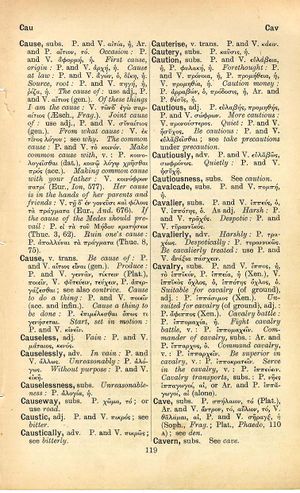cause: Difference between revisions
m (Text replacement - "<b class="b2">Ion</b>" to "''Ion''") |
m (Woodhouse1 replacement) |
||
| Line 1: | Line 1: | ||
{{Woodhouse1 | {{Woodhouse1 | ||
|Text=[[File:woodhouse_119.jpg|thumb|link={{filepath:woodhouse_119.jpg}}]] | |Text=[[File:woodhouse_119.jpg|thumb|link={{filepath:woodhouse_119.jpg}}]] | ||
===substantive=== | |||
P. and V. [[αἰτία]], ἡ, Ar. and P. αἴτιον, τό. | [[prose|P.]] and [[verse|V.]] [[αἰτία]], ἡ, [[Aristophanes|Ar.]] and [[prose|P.]] [[αἴτιον]], τό. | ||
[[occasion]]: [[prose|P.]] and [[verse|V.]] [[ἀφορμή]], ἡ. | |||
[[first cause]], [[origin]]: [[prose|P.]] and [[verse|V.]] [[ἀρχή]], ἡ. | |||
[[cause at law]]: [[prose|P.]] and [[verse|V.]] [[ἀγών]], ὁ, [[δίκη]], ἡ. | |||
[[source]], [[root]]: [[prose|P.]] and [[verse|V.]] [[πηγή]], ἡ, [[ῥίζα]], ἡ. | |||
[[the cause of]]: use adj., [[prose|P.]] and [[verse|V.]] [[αἴτιος]] (gen.). | |||
[[of these things I am the cause]]: [[verse|V.]] [[τῶνδ' ἐγὼ παραίτιος]] ([[Aeschylus|Aesch.]], ''Fragment''). | |||
[[joint cause of]]: use adj.: [[prose|P.]] and [[verse|V.]] [[συναίτιος]] (gen.). | |||
[[from what cause]]: [[verse|V.]] [[ἐκ τίνος λόγου]]; see [[why]]. | |||
[[the common cause]]: [[prose|P.]] and [[verse|V.]] [[τὸ κοινόν]]. | |||
[[make common cause with]], v.: [[prose|P.]] [[κοινολογεῖσθαι]] (dat.), [[κοινῷ λόγῳ χρῆσθαι πρός]] (acc.). | |||
[[making common cause with your father]]: [[verse|V.]] [[κοινόφρων πατρί]] ([[Euripides|Eur.]], ''Ion'', 577). | |||
[[her cause is in the hands of her parents and friends]]: [[verse|V.]] τῇ δ' [[ἐν γονεῦσι καὶ φίλοις τὰ πράγματα]] ([[Euripides|Eur.]], ''[[Andromache]]'' 676). | |||
[[if the cause of the Medes should prevail]]: [[prose|P.]] [[εἰ τὰ τοῦ Μήδου κρατήσειε]] ([[Thucydides|Thuc.]] 3, 62). | |||
[[ruin one's cause]]: [[prose|P.]] [[ἀπόλλυμι]], [[ἀπολλύναι τὰ πράγματα]] ([[Thucydides|Thuc.]] 8, 75). | |||
===verb transitive=== | |||
[[be cause of]]: [[prose|P.]] and [[verse|V.]] [[αἴτιος εἶναι]] (gen.). | |||
[[produce]]: [[prose|P.]] and [[verse|V.]] [[γεννᾶν]], [[τίκτειν]] ([[Plato]]), [[ποιεῖν]], [[verse|V.]] [[φυτεύειν]], [[τεύχειν]], [[prose|P.]] [[ἀπεργάζεσθαι]]; see also [[contrive]]. | |||
[[cause to do a thing]]: [[prose|P.]] and [[verse|V.]] [[ποιεῖν]] (acc. and infin.). | |||
[[cause a thing to be done]]: [[prose|P.]] [[ἐπιμέλεσθαι ὅπως τι γενήσεται]]. | |||
[[start]], [[set in motion]]: [[prose|P.]] and [[verse|V.]] [[κινεῖν]]. | |||
}} | }} | ||
Revision as of 08:49, 20 May 2020
English > Greek (Woodhouse)
substantive
P. and V. αἰτία, ἡ, Ar. and P. αἴτιον, τό.
occasion: P. and V. ἀφορμή, ἡ.
first cause, origin: P. and V. ἀρχή, ἡ.
cause at law: P. and V. ἀγών, ὁ, δίκη, ἡ.
source, root: P. and V. πηγή, ἡ, ῥίζα, ἡ.
the cause of: use adj., P. and V. αἴτιος (gen.).
of these things I am the cause: V. τῶνδ' ἐγὼ παραίτιος (Aesch., Fragment).
joint cause of: use adj.: P. and V. συναίτιος (gen.).
from what cause: V. ἐκ τίνος λόγου; see why.
the common cause: P. and V. τὸ κοινόν.
make common cause with, v.: P. κοινολογεῖσθαι (dat.), κοινῷ λόγῳ χρῆσθαι πρός (acc.).
making common cause with your father: V. κοινόφρων πατρί (Eur., Ion, 577).
her cause is in the hands of her parents and friends: V. τῇ δ' ἐν γονεῦσι καὶ φίλοις τὰ πράγματα (Eur., Andromache 676).
if the cause of the Medes should prevail: P. εἰ τὰ τοῦ Μήδου κρατήσειε (Thuc. 3, 62).
ruin one's cause: P. ἀπόλλυμι, ἀπολλύναι τὰ πράγματα (Thuc. 8, 75).
verb transitive
be cause of: P. and V. αἴτιος εἶναι (gen.).
produce: P. and V. γεννᾶν, τίκτειν (Plato), ποιεῖν, V. φυτεύειν, τεύχειν, P. ἀπεργάζεσθαι; see also contrive.
cause to do a thing: P. and V. ποιεῖν (acc. and infin.).
cause a thing to be done: P. ἐπιμέλεσθαι ὅπως τι γενήσεται.
start, set in motion: P. and V. κινεῖν.

